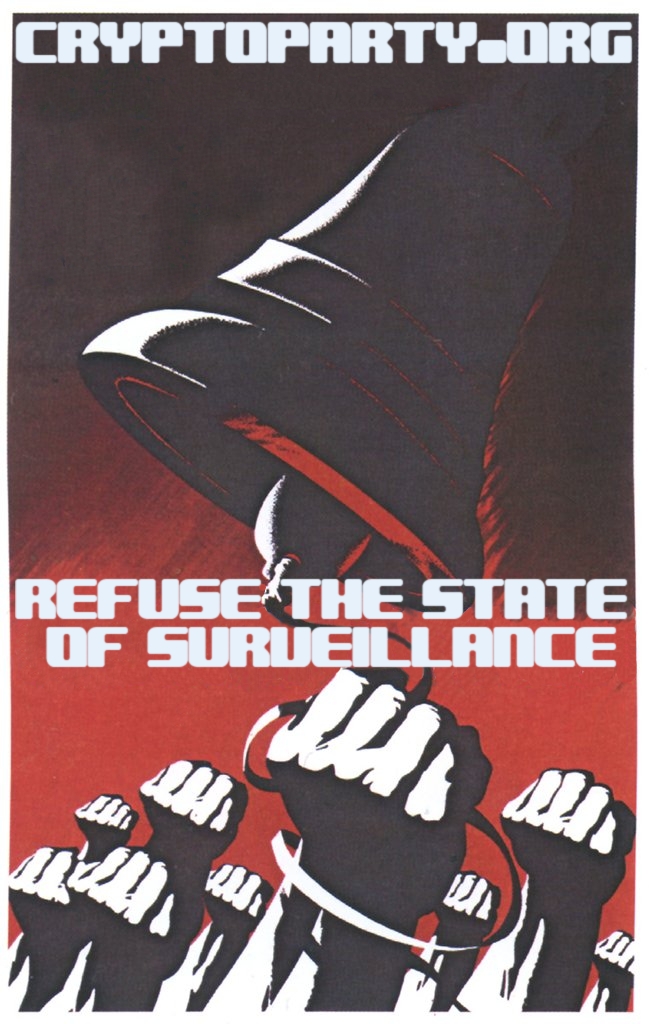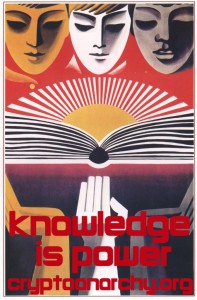
The first CryptoParty in Amsterdam took place on the 27th of September, with the second instalment planned for Monday, December 3rd. I sat down with Jurre van Bergen, one of the organizers from Amsterdam’s Hackerspace. He gave me the run-down of Amsterdam’s first party, which was a bit unique. Dialled in via Skype was Cypherpunk’s Eric Hughes (hear the audio).
During its heyday in the 1990s, the Cypherpunk movement was best known for its active pro-crypto and privacy mailing list. The list’s founder, Eric Hughes, is also famous for writing A Cypherpunk Manifesto in 1993. You’ll find the following quote from the manifesto atop the CryptoParty website:
“Privacy is necessary for an open society in the electronic age. Privacy is not secrecy. A private matter is something one doesn’t want the whole world to know, but a secret matter is something one doesn’t want anybody to know. Privacy is the power to selectively reveal oneself to the world.”

At this edition, Hughes took the place of typical crypto workshops, but the upcoming event will dive straight into hands-on teaching. Jurre says they will explain on how to use tools like “Tor from the Tor Project,” but it mainly “depends on what the people want to know.” “It’s not up to us,” he explained.
Jurre predicts that December attendees will be the most interested in mobile security. “[…] People are interested in learning how to secure their communication,” he told me, “Not only on Facebook, but more generally speaking, on their phones, text messages.”
Beyond just teaching programs, he hopes the CryptoParties will eventually “dive deeper into how certain cryptographic protocols work; really basic language so people can actually understand how it works.”
Who can benefit from a CryptoParty? Jurre stresses that it’s for people of all backgrounds and experience levels. The Amsterdam crowd was a diverse bunch. “There were some journalists,” said Jurre,
“Because most of the people were going to areas like Syria or Iran or Afghanistan. The government eavesdrops on a lot of communications inside, so it’s pretty hard to even get the information to the outside of the world. So, securing their communication, either with sources or back to the broadcasters, it can be quite important. It can mean life or death in these kinds of areas. So it’s pretty important that these people showed up.”
You can also learn the basics without physically attending an event. I asked Jurre what someone like me could learn without any experience:
“What the CryptoParty is doing is making a handbook, which is basically a guideline of how you could secure certain platforms like your mobile phone, your Windows computer, your Mac computer, that kind of stuff. So people are constantly updating that handbook so it’s not really final yet. But I think that’s the best start for people to actually start reading or start contributing to, with questions like, ‘how do I do X’ or ‘how do I do Y’ and ‘what is the most feasible solution to do this’. I think that’s the best option for most people that I would recommend. […] I believe it’s actually with screenshots and that kind of stuff, it really guides you through. So even if you’re not computer savvy, it doesn’t require programming. It’s pretty straightforward.”
It’s also a community project: In other cities, attendees have been known to return to subsequent events to help teach what they’ve learnt. Although it’s too early to tell, we could see the Amsterdam ‘Parties’ go in this direction.
If you’re interested in learning more about cryptography, join the Amsterdam Hackerspace for the city’s second CryptoParty:
December 3, 2012 / 17:00 – late / Location / More details here.
Follow Jurre on Twitter @DrWhax, and the Amsterdam Hackerspace @techincognita
About the movement
In August 2012, the Australian government passed its controversial Cybercrime Legislation, requiring telecommunications companies to keep not only users’ online data, but also text message and other communications.[1][2][3] Within the 30-day period, Australian (and foreign) authorities may request this data. In addition to placing serious new burdens on the companies, the privacy implications were not lost on the Australian public.
One Australian privacy advocate, going by the name Asher Wolf, promptly took her concerns to Twitter. What she thought was a simple exchange of tweets turned into an overnight movement and a global network of Party organizers.
Since the first CryptoParty, more than 40 have taken place across the world, with close to another 30 in the works. Warsaw holds a party on a weekly basis, and Vegas meets monthly.
The website is used for both organization and education, in wiki format. Planners can receive support for their own parties and list their events on the main page. The Resources page is a collection of crypto how-tos and legal information. They are also in the process of crowd sourcing a CryptoParty Handbook that is publicly available in its current format.


